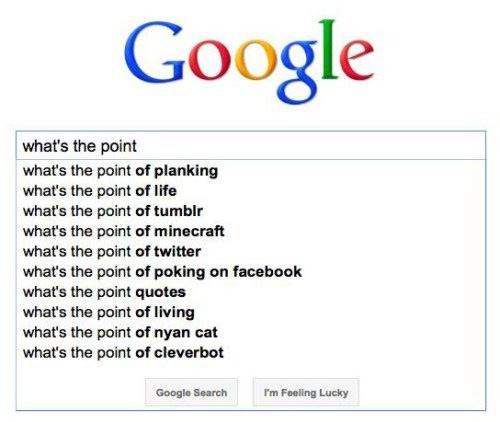[display-name-category]
[post_author]
If you are wondering if you have too many keywords in your AdWords Campaign or how many keywords you need, the odds are you  already have more keywords than necessary.
already have more keywords than necessary.
Chances are you have trouble monitoring the performance of your campaign, which has become a universe of paused, low search volume and below first-page bid keywords
I’m sure that campaign makes you want to start from scratch. Allow me to shed some light on some factors you need to consider before you upload that endless keyword list designed to cover every single variation ever known to man.
Your Advertising Goals and the Size of your Business will Determine the Size of your Campaign
You must establish smart marketing goals and have a set marketing budget aside that matches said goals. Knowing the number of conversions, the revenue and lifetime value of each conversion is a key element to the size of your campaign.
If you are a small business that caters to a local audience and has a conservative budget, you do not want to start with 600 keywords crammed into 20 ad groups. Your valuable advertising dollars will be spent in a couple of hours with no results, and you will end up leaving AdWords for good.
Now, if you are a major distributor of recognized brands that offer free shipping nationwide and can afford to have a full-sized marketing department, things are different. If this is the case, you can have multiple campaigns targeting individual brands, each with a budget that increases as long as there is a need and the ROI is positive.
Notice that I am talking about lengthy campaigns, not ad groups. Regardless of the size of your campaign, you must do a thorough job on grouping your keyword into tightly themed ad groups that do not exceed (on average) three to four keywords for core ad groups and ten on Miscellaneous or Locations ad groups.
How Much Fuel Can You Put on Your AdWords Tank?
Your budget is extremely important because your strategy should take into consideration how much fuel you can put in your AdWords tank. If your budget does not align with your goals and the size of your account, then you simply can’t invest in additional keywords to expand your campaign.
Let’s say your industry is very competitive and the average keyword bids are high.
- I have seen cases in which the bids for a great keyword within a competitive vertical (lawyers, plumbers) equal the total amount set as a daily budget. I am talking about one or two clicks per day, you would require to have a conversion rate of 100% to justify your spend. And let’s face it, that’s not going to happen. So consider the following:
Do I have clear, measurable, and time-constrained goals? (Number of conversions within a specified time frame that can be tracked through AdWords).
Are my goals realistic? (Do I want 200 conversions per week on a $20 budget when my average CPCs allow me to get five clicks per day).
Do I have a marketing budget that aligns with the results I am trying to get? (Considered my vertical’s CPC as well as a realistic conversion rate for my industry).
Is There a Limit to How Many Keywords I Can Use? Yes, and you Should Not Aim to Reach it
So what are the official numbers?
Campaigns
You can add up to 10,000 Campaigns (Including active and paused campaigns)
Ad Groups
You can add up to 20,000 Ad Groups per campaign
Keywords
5 million ad group targeting items per account (such as keywords, placements, and audience lists)
Note: The upper limit for the number of keywords is 5 million. So you’re not in danger of going over the limit, this does not mean that you should strive for a large number of keywords (unless your business model calls for it).
What Should you Take into Account when Deciding How Many Keywords You Need?
Ad Relevance Equals Lower Costs
A usual scenario is to find advertisers with single ad group campaigns and many keywords triggering more than five ads. This simply causes your keywords to fight for traffic and trigger ads that are not relevant to your potential clients to see.
In this case, you need to stop and find a common theme among the ad group and then break it up into different ad groups, you can use a simple approach by starting with Core, Locations, Miscellaneous, Branded, and Competitors.
Again this is just a guideline if your keywords can be bucketed in different categories then by all means do it.
Once you have categorized your keyword correctly then make sure that the ads served for that specific ad group are highly relevant to the keywords and landing pages. By doing so your Ad Rank will increase and you will not have to bid as high for better positions that could result in greater conversion rates at a lower cost.
Do You Have Room in your Marketing Budget for all the Possible Variations of a Service or Product?
The answer is quite simple when using all variations your campaign will be constantly limited by the budget that results in the evident loss of traffic that could result in additional sales, leads, or exposure.
Spreading your budget too thin for the sake of hoarding all possible traffic is not smart, you need to prioritize keyword variations that are driving a positive ROI.
Can You Afford to Dedicate 23 Hours a Day to Monitor your Campaign?
Having an average of 35 keywords at the Ad Group level will require a huge amount of work. You will try and optimize a campaign with keywords that are competing for traffic and perhaps triggering irrelevant ads or low search volume keywords that are not accruing any impressions at all.
This is a taxing endeavor that could be avoided by discarding keywords that are not contributing to your advertising goals (sales, leads, exposure). You already tried them so what is the point of allowing them to clutter your working space.
Do All your Products or Services Equally Deserve a Piece of your Advertising Budget?
Prioritizing services that drive revenue for your business is a sound decision; you should not invest in keywords that target low-profit margin products by doing so you will be reducing the ROI you get from AdWords. If you own a Carpet Cleaning Service you may want to bid for keywords related to the main service you provide:
- +carpet +cleaning +service
- +carpet +cleaning +chicagoIn this particular case we have a core and location variation of the main service which is carpet cleaning, we chose not to use variations with a less profitable service, for example:
+carpet +weaving +repair
The same logic applied to when advertising for different products, for example:
- +septic +pump +aerator
- +septic +chlorine +tablets
In this example, the first keyword is targeting a product that is very profitable versus one that you need to sell in bulk to generate a decent profit margin on it.

So you already have a good amount of core or main Ad Groups into your campaigns with an average of 3 to 4 keywords per ad group. You start to panic thinking that you should expand to all the derivatives, variations, and long-tailed combinations to attract all possible traffic. Think for a second:
Short-tailed keywords variations in BMM cover most of the traffic you need to start your campaign. Having long-tailed keywords in more “restrictive” match types will result in low search volume keywords or keywords that do not generate any impressions, take the following ad group as an example:
- +septic +pump + aerator
- [septic pump aerator]
- +aerator +pump +for +underground +septic +tanks
- [aerator pump for underground septic tanks]
- “aerator pump for underground septic tanks”
- “septic pump aerators”
In this example, +septic +pump + aerator will trigger the traffic for both +aerator +pump +for +underground +septic +tanks and “septic pump aerators”.
While [aerator pump for underground septic tanks] and its Phrase Match twin can easily be a Low Search Volume keyword because you are forcing people to search for 6 words in the same specific order.
On the same note +aerator, +pump +for +underground +septic +tanks will not get a significant amount of traffic (if any) because it will be triggered by your shorter variation(s).
To sum it up, you will be left with two keywords instead of six, +septic +pump +aerator and [septic pump aerator], the exact match variation will take care of specific traffic while the BMM variation captures what Phrase Match would and other relevant variations without having to add many other Phrase Match variations with different word order.
Align The Number of Keywords you Need to Your Marketing Strategy
The size of your campaign and therefore the number of keywords you “need” should be aligned to your online marketing strategy, to sum it all up I would say:
- Start with the most profitable products and services.
- Make sure each one of the keywords for all your ad groups is relevant to their ads.
- Be realistic when aligning your budget with your goals, your reach will be limited with a smaller budget and should be focused on where it matters.
- Working smart is key when it comes to AdWords so spending endless hours optimizing countless keywords is a waste of time.






